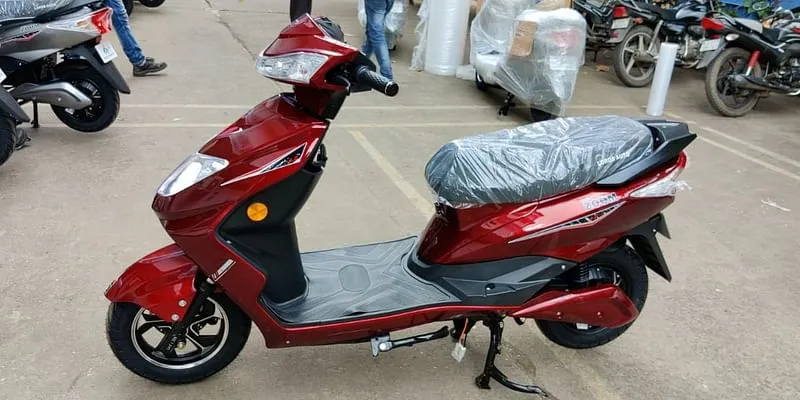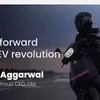How Lord’s Mark plans to ride India's EV boom with e-scooters, e-bikes, e-rickshaws, and even e-vintage cars
Started in 1998, Mumbai-based Lord’s Mark Industries is known for manufacturing health, pharma, and energy products. Now, it is foraying into the booming EV space, which led to the birth of Lord’s Automotive.
Electric Vehicles (EVs) have seen a major uptick in the last few years owing to the growing awareness around sustainability. Affordable and clean energy, which are a part of the United Nations’ Sustainable Development Goals (SDGs) towards 2030, have pushed the adoption of EVs even further.
From pollution reduction to longevity, EVs tick all the right boxes when it comes to protecting and preserving the environment. It is, therefore, easy to understand why the Indian EV market reached $5 billion last year and is slated to reach $47 billion by 2026, growing at a CAGR of 44 percent, says Mordor Intelligence.
Startups to large businesses, companies seem to be rushing to cater to the EV segment to leverage this growth. This September, sold Rs 1,100 crore worth of its S1 electric scooters in two days. Ecommerce major also announced e-mobility initiatives to contribute to reducing the carbon footprint. Players like , , , Tata Motors have added to the boom.
Another company to hop onto the EV bandwagon is . Started in 1998 by Sachidanand Upadhyay, the Mumbai-based company is known for manufacturing health, pharma, and energy products such as LED bulbs, solar street lamps, and more.
Working with the government of India, Lord’s Mark has manufactured and distributed solar street lights across states like Arunachal Pradesh, Andhra Pradesh, Uttar Pradesh, and more. It is also responsible for the solar lights on Indian Navy warships like INS Vikramaditya.
Riding the EV boom
Before 2019, Lord’s Mark was developing a battery storage system (BSS), which can be used to store energy from the grid and supply it back whenever required, especially in situations like a power cut. It was during the development of the BSS, Sachinanand says that the idea to explore the EV space struck.
“I was travelling across Europe and visiting exhibitions and realised that EV is the next big thing. Moreover, the current government is determined to bring new technologies to India,” he tells SMBStory.
Further research revealed that importing, assembling, or manufacturing some of the components was not a very difficult endeavour. The company began the R&D in 2019 at its unit in Silvassa, which created the groundwork for its EV vertical, Lord’s Automotive. It hired technocrats, IIT alumni, and more to work on this vertical, which was officially launched in February 2020.
The first product rolled out by the company was a range of e-scooters — Lord’s Zoom and Lord Zoom - Li — that have a speed of 25 kmph and are available in four colours. Additionally, these scooters are GPS-enabled. While the base model has a lead-acid battery pack, the Li model has a lithium-ion battery pack.
Lord’s Mark’s foray into EV is not limited to vehicles only. It manufactures battery packs of lead-acid and lithium Iron Phosphate (LiFePO4). It will also launch EV charging stations by the end of this fiscal year.

Lord’s Mark has around 180 distributors across the country and claims to have sold 5,000 e-scooters so far.
COVID-19 impact and future of the EV industry
Sachidanand says that COVID-19 disrupted activities at Lord’s Mark too and slowed down the business, especially between March and September 2020. He adds that COVID-19 had a major impact on the pricing of EVs as logistics costs skyrocketed.
“When we launched the e-scooters, they were priced at Rs 60,000. Today, the cost has gone up to Rs 80,000,” he says.
According to Sachidanand, India is currently importing most of the components from countries like China and Taiwan, and assembling the final product domestically. He adds, “It will take at least two years for India to start manufacturing EVs. We can see the prices become a bit stable then.”
The company launched its e-scooters in October 2020. Lord’s Mark has around 180 distributors across the country and claims to have sold 5,000 e-scooters so far.
Earlier this year, it acquired a 100 percent stake in Ahmedabad-based Devam Electric Vehicles Pvt Ltd, which manufactures e-rickshaws, to enhance its portfolio.
The business is also in talks to acquire a stake in another Lucknow-based e-rickshaw manufacturer. Sachidanand explains, “This will help us capture the northern and eastern part of the country because Lucknow is centrally located. Moreover, logistics cost makes a big difference for us.”
The company is also open to partnering with OEMs. Going forward, Sachidanand says Lord’s Mark plans to launch scooters with greater speed, e-bikes, e-rickshaws, and even e-vintage cars.
The e-vintage cars will be a luxurious range, which he plans to station in hotels and resorts in cities like Delhi, Chandigarh, and Lucknow.
YourStory’s flagship startup-tech and leadership conference will return virtually for its 13th edition on October 25-30, 2021. Sign up for updates on TechSparks or to express your interest in partnerships and speaker opportunities here.
For more on TechSparks 2021, click here.
Edited by Saheli Sen Gupta









